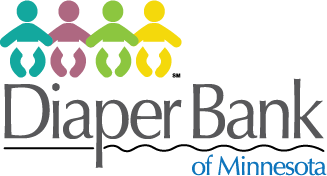Two recent news stories have highlighted the importance of diaper need and ways that people can help. In March, the New York Times published an article titled “Living Paycheck to Paycheck, Diaper to Diaper.” This article provides an overview of some of the challenges faced by families, highlighting some new research from Jennifer Randles, an associate professor of sociology at California State University, Fresno. Notably, more than half of the 70 women interviewed by Dr. Randles for this study said that they were more stressed about affording diapers than they were about food, housing, or electricity. The article also addresses the stigma that families may experience when they struggle to provide diapers.
“Cora, a mom of five, told Dr. Randles: ‘I worry about diapers more than food because we can portion our food. We get some food stamps, always have at least a can of something. You can’t really portion your diapers in the same way and say, ‘OK, I’m going to use only three diapers today.’ What if your kid goes poop four times?’”
“People just judge you more,” Yesenia, a mom of two, told Dr. Randles. “If we needed help with housing or food, people get that, but what does it say about you as a mother if you can’t provide diapers, the one simple thing only your child needs?”
The Washington Post also had an article around the same time, “Millions couldn’t afford diapers before the pandemic. Now, diaper banks can’t keep up.” This article focuses on the consequences of the COVID-19 pandemic, as it relates to families experiencing diaper need. Across the country, diaper banks (including the Diaper Bank of Minnesota!) have seen a tremendous increase in need. While we, like many other diaper banks, were able to increase diaper distribution over the past year, we know that need remains high.
Diaper banks play a critical role in helping to address diaper need, a need that is not adequately addressed in government programs or other safety net services. Most diapers banks do not receive any financial support through government programs, and rely on donations and grants to serve the community. You can help us address the important issue of diaper need in the Twin Cities. We encourage you to read these articles to learn more, and consider making a donation to support our efforts to help families.
